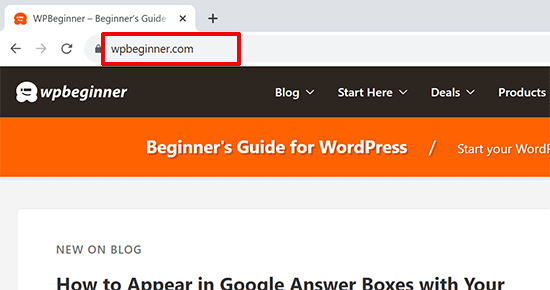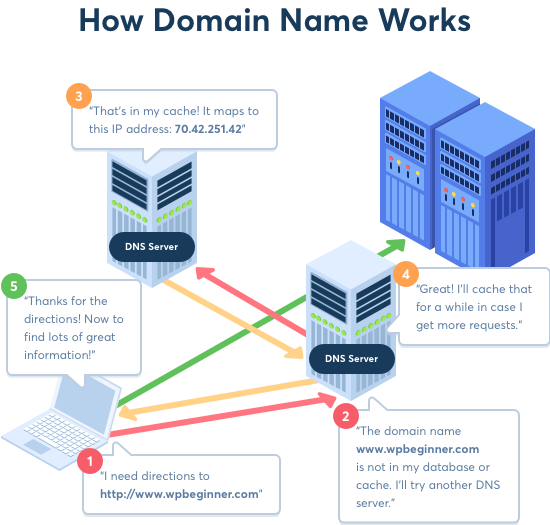Starting a website can feel a bit like learning a new language, especially when you encounter terms like ‘domain name’ and ‘web hosting’.
As we have helped users get started with their first website over the last 15+ years, we have found that many beginners think these are the same thing. However, understanding the difference between them is an important step in building your online presence.
This beginner-friendly guide will help you clearly understand domain names and web hosting so that you know what they do and why you need both to get your website up and running.

What Is the Difference Between Domain Name and Web Hosting?
A domain name is the address of a website. This is what users type in their browser’s address bar to visit a website (e.g., google.com or wpbeginner.com).

On the other hand, web hosting is where a website’s files and data are stored.
Think of web hosting as the house where a website’s files and data live, while the domain name is the address that points to that house.
That being said, let’s look at domain name and web hosting in more detail.
Video Tutorial
If you’d prefer written instructions, keep reading.
What Is a Domain Name?
A domain name is the address that people type in the browser’s URL bar to visit your WordPress website.
In other words, if your website were a house, then the domain name would be the address that helps people find and reach your website.
Now, let’s get into the detailed explanation.
The internet is basically a giant network of computers connected through cables. To easily identify them, each computer is assigned a series of numbers called IP Addresses.
This IP address is a combination of numbers separated by dots. Typically, IP addresses look like this:
66.249.66.1
Computers have no problem identifying and remembering these numbers.
However, humans can’t remember and use these numbers to connect to websites on the internet.
To solve this problem, domain names were invented.

A domain name can have words, which makes it an easy-to-remember website address.
Now, if you want to visit a website online, you don’t need to type in a string of numbers. Instead, you can type in an easy-to-remember domain name like wpbeginner.com.
To learn more about domain names, look at our beginner’s guide on domain names and how they work.
You can also check out our guide on how to choose the best domain name. It includes tips on picking the right domain extension, using keywords to improve your online presence, creating a brandable domain name for your small business, and more.
What Is Web Hosting?

Web hosting is the place where all the files of your website are. It is like the home of your website where it actually lives.
A good way to think about this is if the domain name were the address of your house, then web hosting would be the actual house that the address points to.
All websites on the internet need web hosting.
When someone enters your domain name in a browser, the domain name is translated into the IP address of your web hosting company’s computer.
This computer, also known as a hosting server, contains your website’s files and sends them back to the users’ web browsers.
Web hosting companies specialize in storing and serving websites. They provide resources like RAM, bandwidth, and CDN, which help improve the speed and performance of your website.
How Are Domain Names and Web Hosting Related?
Domain names and web hosting are two different services. However, they work together to make websites possible.
Basically, a domain name system is like a massive address book that is constantly updated. Behind each registered domain name, there is an address of the web hosting service storing the website’s files.
Some domain registrars may provide temporary domain hosting. However, it is still not a website.
Without domain names, it will not be possible for people to find your website, and without web hosting, you cannot build a website.
This is why many top domain name registrars also offer web hosting services.
How Are Domain Names and Web Hosting Different?
The main difference between domain names and web hosting is that domain names point users to the location of your website, while web hosting is where your website lives.
Think of it like this. Web hosting is the house where you store your website files, and the domain name is the address of that house.
They are two different but related services. This brings us to the next question: What do you need to build your website: a domain name or web hosting?
What Do I Need to Build a Website? Domain Name or Web Hosting?

To build a website, you will need both a domain name and a web hosting account.
Buying a domain name alone only gives you the right to use that particular domain name for a specific period (usually one year).
You need web hosting to store your website’s files. After you get hosting, you need to update your domain name settings and point it to your web hosting service provider.
You can also buy both the domain and hosting from the same company. Pricing may vary, but usually, a domain name costs $14.99 / year, and web hosting normally costs $7.99 / month.
If you are starting your first website, then this may sound like a lot.
Thankfully, Bluehost, an official WordPress-recommended hosting provider, has agreed to offer our users a free domain name and over 50% off on web hosting.
Bluehost hosting packages also come with a free SSL certificate, domain privacy, free email accounts, a user-friendly control panel, and more. Plus, there’s a 30-day money-back guarantee.
As an alternative, we are now also recommending Hostinger, which is a fast-growing WordPress hosting option, and they’re offering our readers an 80% discount. In our recent performance tests, Hostinger is really outperforming others in terms of hosting speed.
Once you have purchased website hosting and registered your domain name, you can start building your website. For complete step-by-step instructions, see our guide on how to make a WordPress website.
Do I Have to Buy a Domain Name and Hosting Together? Or Can I Buy Them Separately?
You can buy a domain name and web hosting from two different companies. However, in that case, you will have to point your domain name to your web hosting company by editing its DNS settings.
On the other hand, if you purchase your domain name and web hosting from the same company, then you will not have to change your domain name settings.
It is also much easier to manage and renew both services from the same dashboard.
If you want to buy domain names separately, then you can do so from top domain registrars like Domain.com, Network Solutions, GoDaddy, Namecheap, or HostGator.
Can I Move My Domain Name to a Different Company?

Yes, you can. Normally, when you register a domain name, you own the right to use it and transfer it anywhere you want.
For example, let’s say you purchased your domain name from Domain.com and your web hosting plan from Bluehost.
Now, you want to move your domain name to Bluehost to make it easier to manage and renew your website’s domain name.
You can easily do that. Both companies have helpful customer support teams and detailed step-by-step instructions that you can follow to transfer your domain name.
Note: We recommend you wait at least 45 days after the domain name registration or renewal to initiate the transfer. ICANN, the international organization that oversees domain names, requires a one-year renewal whenever a transfer is initiated. Transferring your domain name before that period could lose you that year’s renewal fee.
Can I Move My Website to Another Web Hosting Company Without Changing Domain?
Yes, you can do that as well. You own the domain name and can change its settings to point it to any web hosting company.
For example, you purchased your domain name and hosting from GoDaddy, and now you want to move your web hosting to Bluehost. You can move your site from one host to another by simply transferring files and data. After that, you need to edit your domain name settings and point them to your new web hosting provider.
Another example: you purchased your domain name from WordPress.com (See our guide on the difference between WordPress.com vs. WordPress.org). Later, you want to move to a self-hosted WordPress.org website.
First, you will need to sign up for a WordPress hosting account. After that, you can move your site from WordPress.com to WordPress.org. Lastly, you will just need to edit your domain name settings on WordPress.com and point them to your new WordPress hosting provider.
Related: See our guide on when you should change your WordPress web hosting for more tips.
Can I Change My Domain Name or Move My Website to a New Domain?

Once you have registered a domain name, it’s not possible to change or modify it.
However, you can register a different domain name at any time. You can also register different TLDs or domain extensions—for instance, .org or .net.
But if your business has changed and your current domain name is no longer suitable, you may want to move your website to a new domain. In that case, you will need to purchase a new domain name and link it to your website.
Moving your own website to a new domain needs to be done carefully, though. That way, you won’t lose the SEO rankings and search traffic you’ve worked so hard to build.
What Are Different Types of Domain Names?
Domain names are available in different top-level domains (TLD) or extensions. A TLD is the part that comes after the actual name. For instance, in wpbeginner.com, the .com part is the TLD.
The .com is also the most popular domain extension. We recommend our users to stick with .com when choosing a domain name.
Other common domain extensions include .org, .net, .info, .biz, and more.
Apart from top-level domains, there are also country-code top-level domains or ccTLDs. For instance, .co.uk for the UK, .de for Germany, and so on.
What Is a Subdomain?
A subdomain is a child name added to a domain name. For instance, videos.wpbeginner.com is a subdomain.
Subdomains don’t need to be registered. A domain owner can create a subdomain under their domain name using the domain management area.
You can follow our tutorial on how to move WordPress to a new domain without losing SEO. It includes step-by-step instructions for creating backups, setting up 301 redirects, notifying Google about your new domain, and more.
What Are Different Types Of Web Hosting?
There are several types of web hosting services available. Website owners can choose a web hosting plan based on their needs and budget.
Here are some of the web hosting plan categories.
- Shared Hosting – The most common type of web hosting plan used by bloggers and small business websites.
- VPS Hosting – Suitable for busier websites with more traffic, this hosting plan gives website owners dedicated server resources that they can adjust as their website grows.
- WooCommerce / Ecommerce Hosting – This type of hosting plan is suitable for online stores. It offers more server resources to run an online store efficiently.
- Managed WordPress Hosting – Specialized hosting plans that are optimized for WordPress. They offer automatic updates, built-in caching, and faster servers.
Busier sites can also opt for cloud hosting, dedicated hosting, and managed dedicated hosting plans.
You can see our article on WordPress hosting to learn more about choosing the right hosting for your website.
We hope this article helped you learn the difference between a domain name and web hosting. You may also want to see our guide on how to choose the best domain name and our expert pick of the fastest WordPress hosting.
If you liked this article, then please subscribe to our YouTube Channel for WordPress video tutorials. You can also find us on Twitter and Facebook.





Dennis Muthomi
VERY good core concept explanation!
I have a QUICK question: if I create a subdomain under my main domain name, can I host the subdomain on a different web host than my main domain?
WPBeginner Support
It is possible but would require you to make some changes to your DNS settings to do that.
Admin
Mrteesurez
I didn’t know you could host a subdomain on a different web host than your main domain! That’s really useful information. Thank you for your support. This opens up a lot of possibilities for managing different parts of a website more efficiently. I appreciate the clear and straight forward answer!
Dayo Olobayo
I often find that people don’t understand the difference between domain names and web hosting. I was once in that spot myself. This is a clear and concise explanation that I’m sure will be helpful for many people.
LOUIYEE ROLDAN
This article stated the differences in three occasions -what is a domain and what is hosting.
It’s a bit repetitious for someone with short time to read and learn (add my time to type this here). I know there’s many people out there trying to learn, but it would accomplished it message succinctly with a few separations.
Thanks though!
WPBeginner Support
Thank you for your feedback, the content of the post was from questions we have received from users so we wanted to ensure we covered all of the questions asked
Admin